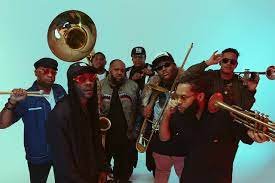Nicholas Payton Takes the Mixtape Seriously at Jazz Fest

There's a reason he called his new two-CD set "Afro-Caribbean Mixtape."
Nicholas Payton’s Afro-Caribbean Mixtape is his strongest presentation of #BAM—Black American Music—as a concept. His reach is at its most transparently broad on the album, but is also feels organic. The album is a clear, coherent body of music and not a polemic, despite the presence of recorded voices that show the roots of #BAM. The pleasures come not from the fact that he crosses musical streams many times over the course of two discs but the way that he does it, honoring every genre he touches, including hip-hop. Payton plays Jazz Fest’s WWOZ Jazz Tent Sunday at 4:05 p.m., and he’ll have his DJ—DJ Lady Fingaz—with him on the gig as a part of the band.
“I don’t think you can effectively represent hip-hop without a DJ,” Payton says. “It’s integral to the song. I wanted to have a way musically to inject these spoken samples where I press play on a device and let the sample run, and we just play over it. I wanted it to be an instrument within itself, and for me the best way to do that would be to employ a DJ who could rhythmically trigger these phrases, these words, and be a part of the ensemble.”
Before the mixtape became a hazy part of the hip-hop ecosystem—is it or isn’t it an album?—it was literally a cassette of music curated by someone who hit pause after each song on the tape while the next song was cued. For many DJs, it was a pre-turntable introduction to looping. Payton used that as a reference point.
“I wanted to assemble this album like a mixtape,” he says. “I grew up in the era of the mixtape, where before we could create YouTube or Spotify playlists, we had to physically create these mixtapes by the pause/record approach. I assembled this record like a beatmaker or someone who’s making a mixtape who would select the best moments of something in order to create a story or tell a narrative.
“I stopped writing tunes about 10 years ago. At this point, I create moods, have moments of inspirations, and hear motifs, and I record them into a recorder. Over the past five years, it has been my voice memo on my iPhone. When it’s time for me to make an album, I go into this bank of ideas that I have and I select the best ones that I find appropriate for that project. I essentially make a mixtape of the ideas in my phone, and some songs have several takes, many of which you’ll hear on the album. The song “‘Kimathi’ appears four times throughout the two discs. I selected the best moments and dispersed them throughout the album like a mixtape, like a collage.
“Once I assembled all those best moments from the six to eight hours that we recorded, then I sequenced them and literally put them on tape and ran it through a reel-to-reel tape machine. And in between, you’ll hear a lot of tape scrubbing, the fast forward and rewind toggling, the sound that you get scratching music through a tape head.”
My Spilt Milk will have more with Payton on Afro-Caribbean Mixtape in the coming weeks.






